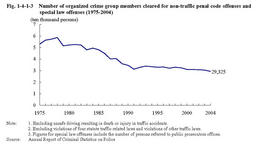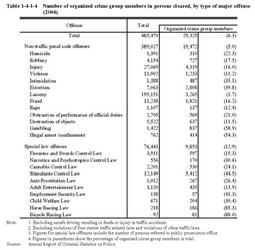| Previous Next Index Image Index Year Selection | |
|
|
2 Non-traffic penal code offenses and special law offenses Fig.1-4-1-3 shows the number of organized crime group members cleared for non-traffic penal code offenses and special law offenses(excluding unsafe driving resulting in death or injury in traffic accidents,violations of four statute traffic related laws,and violations of other traffic laws;hereinafter the same in this subsection)over the last30years.
Those members cleared were stable between30,000and40,000since1991,and were29,325in2004,a decrease of4.0%from2003.Among them,9,180persons were regular members,decreased by9.2%(id.). Fig.1-4-1-3 Number of organized crime group members cleared for non-traffic penal code offenses and special law offenses(1975-2004) Table1-4-1-4 shows occupancy of the number of organized crime group members in the total persons cleared for non-traffic penal code offenses and special law offenses in2004.Among those group members cleared in2004,19,472(decreased by3.9%from2003)were for non-traffic penal code offenses,and9,853(decreased by4.2%(id.))were for special law offenses.They had large occupancy rate for gambling(58.9%),illegal arrest/confinement(54.3%),extortion(39.8%),and intimidation(35.1%)for non-traffic penal code offenses,and Bicycle Racing Law violations(88.0%),Horse Racing Law violations(85.3%),Stimulants Control Law violations(44.5%),and Employment Security Law violations(41.3%). Of organized crime group members cleared,Stimulants Control Law violations were the highest at18.5%(5,412persons),followed by injury at14.7%(4,319persons),larceny at11.1%(3,265persons),and extortion at9.6%(2,808persons). Table1-4-1-4 Number of organized crime group members in persons cleared,by type of major offense(2004) Explanation of terms Designated organized crime groups: The Anti-Organized Crime Group Law regulates designated organized crime groups and alliances of designated organized crime groups,which are collectively called designated organized crime groups,etc.However,all of the24organized crime groups that have been designated by December31,2004,are designated organized crime groups.The Prefectural Public Safety Commission decides such designation through specific procedures such as holding public hearings or requesting the confirmation of the National Public Safety Commission. Termination order: The Anti-Organized Crime Group Law prohibits some acts that have not been regulated under traditional laws and regulations,such as violent acts of designated organized crime group members demanding money or goods from citizens by flaunting the threat of the designated organized crime groups to which they belong.The Prefectural Public Safety Commission may issue orders to stop such acts against those designated organized crime group members who have committed such illegal acts or to take necessary actions to stop them.These orders are called"termination orders,"and a person who violates such order is sentenced to imprisonment with labor or to fine. Additionally,the partial amendment of the Law in1997provides that a person who has some relationship with a designated organized crime group but is not a designated organized crime group member shall also be subject to a termination order,as having committed a quasi-violent act,if he demands money or goods from citizens by flaunting the threat of the designated organized crime group to which he is related. Recurrence preventive order: In cases where designated organized crime group members have committed acts that are prohibited by the Anti-Organized Crime Group Law and where there is a possibility that they will repeatedly commit similar acts,the Prefectural Public Safety Commission may issue orders,which are effective for a certain period within one year,for necessary actions to prevent such acts.These orders are known as"recurrence preventive orders,"and a person who violates such order is sentenced to imprisonment with labor or to fine.Moreover,under the partial amendment of the Law in1997,quasi-violent acts are also subject to recurrence preventive orders. |

